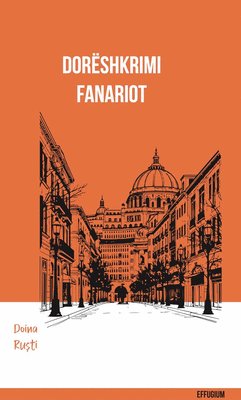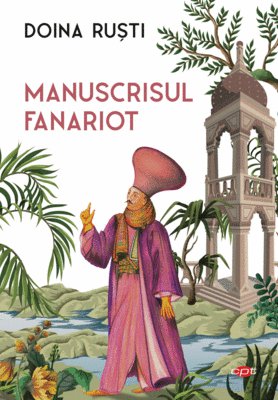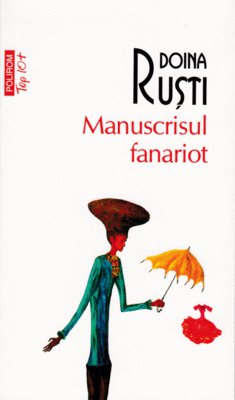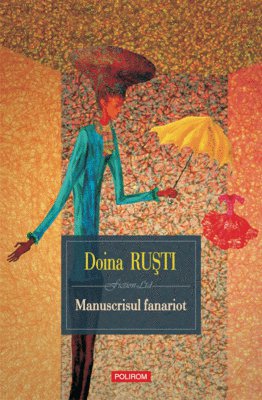



The Phanariot Manuscript is a sumptuous book, endowed with contagious sensuality. It is a poem dedicated to Phanariot Bucharest — a city, or rather a makeshift urban sprawl, that sways day and night to the languid rhythm of oriental tunes, immersed in the smoke of hookahs, in superstitions, rumors, and magical aromas, surrendering at times to endemic frenzies and nameless melancholies.
If it were only this, it would already be enough.
But the story of an impossible love that shatters all conventions — told with her well-known talent and supported by real documents — lifts the curtain on a world of ruthless customs, private intrigues, and strange habits that would perplex even the most erudite critic.
Eugen Negrici
… the atmosphere of a fervent city, teeming with life, shaken by strong passions, desires, and ambitions.
The Phanariot Manuscript is a luxuriant novel, with a dense, multi-layered plot and a multitude of characters. A historical and social fresco, a love story inspired — it seems — by a real manuscript, this is one of Doina Ruști’s finest novels, if not her best.
Luminița Corneanu, România literară, April 3, 2015
Rolled through the honey of archaic words, softened by the silky touch of poetry, the Phanariot world of Bucharest comes alive in Doina Ruști’s enchanted coral. A historical novel of atmosphere, tinged with magical realism, The Phanariot Manuscript is a seductive book that draws you into its spell like a trail of intoxicating perfume, like a hypnotic gaze.
Gabriela Gheorghișor, Ramuri, no. 4/2015
In The Phanariot Manuscript, this excellent novel of manners, we rediscover the survival mechanisms and the recipe for success in contemporary Bucharest — with its scandals, unholy alliances, and politico-economic promiscuity that can raise you, overnight, to become the prince’s counselor — or his accomplice. How does daily life unfold in this city of all possibilities? That is the great question The Phanariot Manuscript answers.
Cristian Teodorescu, Cațavencii
Doina Ruști’s Manuscript deserves a place high among those fictions that shake worlds and disturb literary inertia.
Alina Purcaru, Observator cultural
The Phanariot Manuscript is a feast of historical prose. Built from rare details of the age and from the impulse to save, through fiction, a fragment of real history unearthed from the archives, the novel brings to life a bygone world with distinctive morals and a sensuality that pervades every scene.
Andra Tischer, Facebook
As in Zogru, that marvelous book by Doina Ruști, The Phanariot Manuscript contains passages that pierce your mind and haunt you:
“In the silence that floated, Leun came closer to her, trembling. From the thick mud of their blood burst sighs, like from a swamp. Neither had ever kissed before. Neither had touched flesh ravaged by longing. They did not even suspect the existence of that craving that burns all trace of thought. Yet as they approached, and their mouths searched for fulfillment, they were struck by that one true impulse that every human soul reaches in the end: the happiness of being just a rag rotting in a stranger’s wound.”
What an image... what a descent into the deepest strata of being, where true emotions dwell.
I invite you to discover a world that unfolds gradually before the reader, in scenes of piquant savor rarely found in our recent literature — a world that imprisons you and to which you’ll return, like to “the good water,” in secret moments.
Alina Pavelescu, Facebook
The Phanariot Manuscript — a charming book about our everyday Bucharest, that Babylon of tongues, scents, colors, and above all, of loves. A book as rich as a library of history, which I recommend to all my historian and archivist friends.
Handling words like a jeweler working precious gems, arranging them carefully in the brocades of literary Balkanism, Doina Ruști builds a novel with a fascinating architecture — one that dreams, sighs, sings, and laughs like the keys of a piano in emerald solitude.
The novel is a Song of Songs dedicated to the Word in all its forms: Logos, profane word, sound, song, prayer, incantation, curse, and spell.
Andreea Hedeș, Luceafărul, May 2015
A euphoric city, living through its senses, populated by luxurious carriages and Viennese coaches, where whispers flow softly, vitriolic, ignoring the power of its true masters — Saint George and Saint Demetrius, the one slayer of beasts, the other protector of the city. It smells of wine must and grilled meat; women lift their skirts by the bridges; there’s a lascivious air, as if nothing bad could ever happen. But it’s only an illusion. Behind the smoke, games, songs, and intrigues shift the balance of power overnight — in both the great and the small history.
The Phanariot Manuscript is like a fine perfume.
Constantin Piștea, BookHub
An admirable novel that resurrects a vanished era — the Bucharest of the late 18th century. Everything is surprising: the atmosphere, the makeshift urban structure, the instability of rulers, the sudden change of princes, the plague that killed three or four people a day for a year, the magic of witches killing at a distance with cricket water, the passions, the bizarre costumes, the sumptuous, flavorful language filled with unforgettable images and rare, aromatic old words, and above all, an impossible love.
Stelian Țurlea, Ziarul de duminică, May 21, 2015
Reading the novel, one imagines a Bruegel painting transported to the banks of the Dâmbovița, every face telling a story in a dense, noisy human arabesque. Bucharest lived feverishly, to the point of delirium, in noisy sensuality, in its Frenchified words mixed with Turkish curses and the songs of tavern minstrels recounting the adventures of boyars and beggars alike. Among Ottoman robes and heavy jewels, boyar ladies displayed their Viennese wigs, like the women painted on clavichords.
The Bucharest of Maiorca and Leun is a swarming mirage.
Adriana Gionea, Post Modern, May 27, 2015
Doina Ruști’s novel seduces from the first to the last word. Nothing is superfluous; the stylistic texture carries the patina of the age; the narrative thread is delicate, elastic, transparent. The Phanariot Manuscript has all the qualities to be considered the novel of the decade.
Adrian Romilă, Convorbiri literare, May 2015
Breathing the same succulent Balkan air as the works of Ștefan Agopian or Silviu Angelescu — or, why not, of Nicolae Filimon, Mateiu Caragiale, or Eugen Barbu (The Prince, The Week of Madmen) — Doina Ruști’s novel opened the new literary year brilliantly, with an exceptional book indeed.
Ion Predescu, Săptămâna în Oltenia, June 2–8, 2015
Rarely has a novelist from these lands managed to infuse so much meaning into a work that leaves no remainder. Leun, Maiorca, Cucumeaua transcend convention, attaining redemptive resonance.
Andreea Chebac, Bookblog
If you love historical novels — not so much for reconstruction as for atmosphere — you will be as enchanted as I was. Based on thorough research that enriches every detail and ornament, the novel exudes a mystical air from the start, being inspired by a real manuscript reproduced in the book.
Ioana Colac, Alecart, no. 14, 2015
You cannot miss Doina Ruști’s passion for language and the dexterity with which she envelops you in the folds of a honeyed tongue that conceals both refined lyricism and complex analyses of sound. She creates images of striking dynamism, guiding us on an initiatory journey streaked with oriental aromas and local realities.
Mariana Criș, Cultura, no. 525, July 18, 2015
The Phanariot Manuscript is a dense, poetic, and sensual book — a testimony to times when Bucharest was steeped in the smoke of hookahs, when colorful trousers filled the markets, and rumors became legends. It is a novel about communication, language, and customs that still explain much of the Bucharester spirit. A fascinating, deeply literary work that you won’t forget soon.
Anca Ligia Petre, Semne bune, July 2015
With its extraordinary descriptive power, Ruști’s novel is more a poem — a poem of Bucharest itself, of the city born from words, stories, legends, and mythologies. This textual metamorphosis, often happening before our eyes, expresses her predilection for a kind of sound-based fantasy — a music of language that comes alive and casts its own spell.
Dan Cristea, Luceafărul, July 2015
Doina Ruști embraces the past with charm and erudition, turning the picturesque and the dross of history into vivid art — always with a smile.
Călina Bora, Steaua, nos. 7–8, 2015
The color of sounds and the bustle of words seem to be two of Ruști’s specialties. Her Phanariot Manuscript is a vigorous, intelligent response to the heavy, pretentious muck from which our Balkanist prose is often molded. The novel unfolds polyphonically, in a Phanariot Bucharest depicted with topographical and ethnographic precision. Never before have I seen such attention to the detail of daily life — not picturesque, but socially empathetic.
Among other things, it’s also an analysis of the mechanisms that make this aberrant settlement — Bucharest — function: a chaotic blend of rural residues and refined pretenses.
Doina Ruști is a conceptual artist, hiding abstract speculation in the tough flesh of a love story — all born from a few ancient words.
Călin Dan, Observator cultural, Sept 23, 2016
With The Phanariot Manuscript, an excellent novel, Doina Ruști reconfirms her mastery of prose and enriches her narrative palette without ever confusing her colors like an apprentice.
Daniel Cristea-Enache, România literară
“A complete and seductive immersion into the atmosphere of Phanariot Bucharest, through intensely sensory writing that evokes a world at once unfamiliar and deeply alluring to the contemporary reader. This is the Bucharest that once drew the wagers of the wealthy Greeks from the Phanar — the gayest place in the Balkans, an amphitheater where nothing ever rests and every gesture matters.
Here, laundry is washed noisily in the Dâmbovița; dice players cheer in ecstasy; crossroads bloom with multicolored turbans; parties run day and night amid the scent of wine and grilled meat, while courtyards turn into open-air salons for the hundreds of curious eyes searching for scandal or song.
A city of illusions, of slippery psychology, where promises rarely hold, gold is weighed down with lead pellets, and confectioners make sweets from rotten fruit. A capital of myths, superstitions, and unpredictable metamorphoses (especially when the plague or locust swarms come).
You will fall in love with this brilliantly documented novel — a truly beautiful and original literary surprise.”
Sever Gulea, Tiuk
Doina Ruști’s books also thrive on reminiscences in memory, more precisely from the words whose melodic sounds or stridencies determine the development of the story. She is another writer, but an author of literature, with interests avowed in the history of Bucharest in the 18th century. The archeology of the city’s symbols is pursued by recourse to the conventions of the form and style of literature, but beyond this, it is obvious that a series of documents from the historical archives are valued. The fiction registry allows the writer to have greater freedom in the act of re- writing the past. In the absence of sources, empty spaces are open to both the plausible and imagination tricks. The results show that, paradoxically, “literary fiction may be truer than the truth itself”, the simulated authenticity going to the confusion of reality with fiction.
First of all, these novels are provided with maps as pre-established framework for the fictional paths. Doina Rusti’s Bucharest is one of perception, not of certain knowledge, illusory and allusive at the same time. This does not mean that the scaffold is not made up of documentary material extracted from archive funds. On the contrary, we have a lot of places, people, conflicts, intrigues and descriptions that we can identify in the content of the existent 18th century manuscripts, because the purpose of the writer is to simulate the authentic historical appearance. The process is of intertextual nature, by the intermingling of ancient sources.
Going further, what is taken into account are the parameters that generate the fictional mechanism. In the Prologue of Manuscrisul fanariot (The Phanariot Manuscript), a narrative voice from the background tells the story of sultan Selim who discovers one day the score of a song about a terrestrial paradise, a city where there is no sadness, only happiness and joy: Bucharest. Spread all over the city of Istanbul, the rumor draws particular attention to the Greek community in the Fanar district, as an invitation to get easily the natural impossibility to own the reign, or important political and military functions. The young Vlach Ioanis Milikopu, son of a fisherman, the main character of the novel, comes to Bucharest conquered by the welfare stories in circulation, to follow his adventure of life. As the narrator describes, “a word is a small worm, meant to multiply beyond measure. It goes into the labyrinth of your ear with a map in the pocket, and makes no stop, no alliance [...]”. This kind of fake news transmitted by voice, on the basis of unverified stories, puts Ioanis in touch with a reality where he loses the identity becoming Leun, the French servant of the consul of Rusia in the Wallachian capital.
Cristina Balinte, Bulletin of the Transilvania University of Brașov Series IV, Vol. 10 (59) No. 2 – 2017
Maiorca, ravishing in her unique beauty, but also a little sorceress, the perfect disciple of her witch mother, Tranca, hipnotizes Leun with her Gypsy magic, while heraling him of his swollen nose, caused by bad berries, warning him of devilish side-effects. Finally, they are having a romantic night, in Bozăria, a place where impossible love and magic turn possible. After their night together, his supreme drive will be that of making her a dress so special that nobody can afford, a dress made of the finest silk, fromMalta. Maiorca is however promised to a Gypsy slave, the property of the boier Doicescu.
See also Critical Reception
and [BIBLIOGRAPHY]
Puskás-Bajkó Abina, JOURNAL OF ROMANIAN LITERARY STUDIES, nr 9, 2016